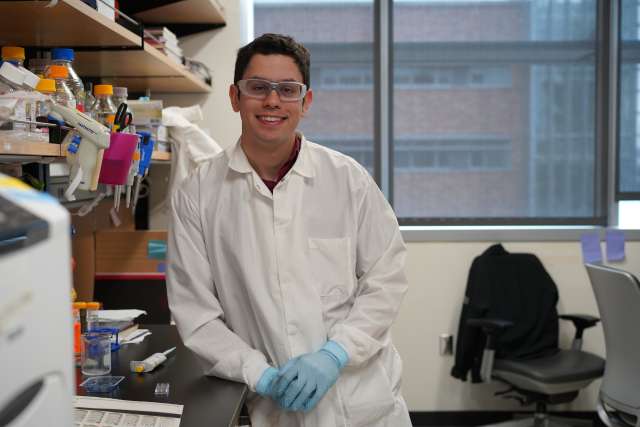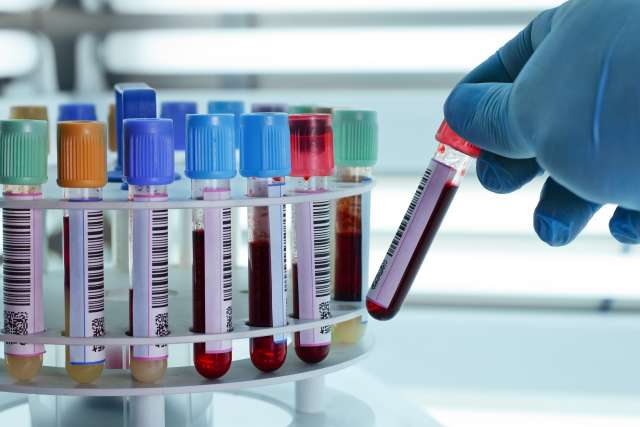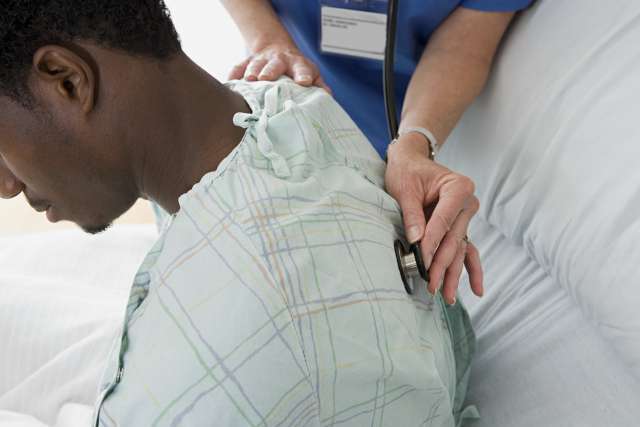Cristian Rodriguez never imagined he'd find himself working with stem cells in a UCLA research lab, let alone receiving Cal State Northridge's most prestigious award given to a graduating senior.
Just a few years ago, Rodriguez — the youngest of five children from a family of Mexican tenant farmers — wasn't even considering college. Instead, he planned to train as a firefighter straight out of high school, a path he believed would enable him to do good while earning a stable salary that could help support his elderly parents, who still work physically demanding jobs.
CSUN’s Wolfson Scholar recognition is given to a student with not only an exceptional academic record but who has also made significant contributions to the university or community. This honor, given to just one student from a graduating class of roughly 9,000, is a testament to Rodriguez's mentors, his family's sacrifices and his own unwavering commitment to service.
"It was really C5LA, a youth development program that helps students get to college, that opened my eyes to other possibilities," he said. "But the real turning point came when my dad told me, 'You're meant to lead a different life. You have potential.' That's when I seriously considered college."
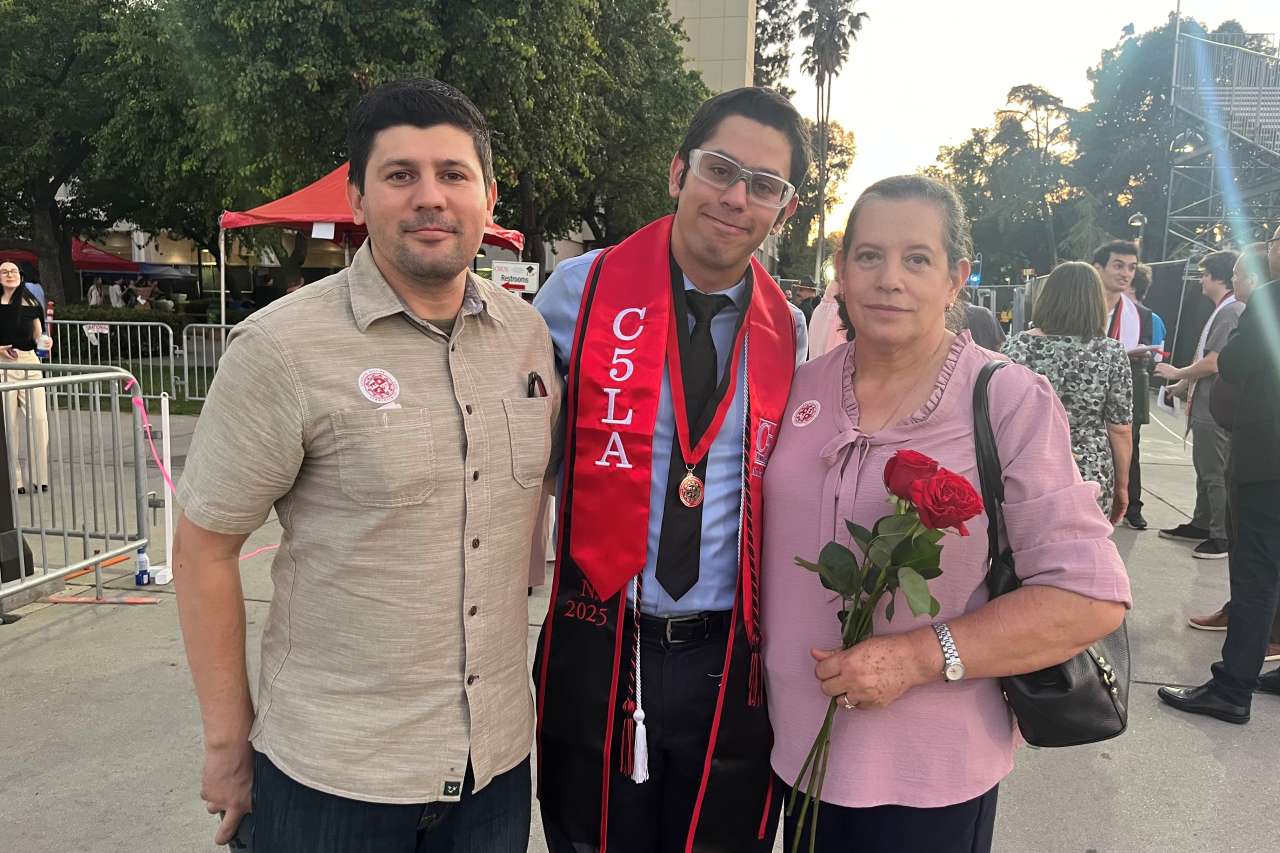
Cultivating a passion for research
In 2020, Rodriguez started at CSUN with the plan of becoming a doctor. He was drawn to the profession after watching his father and brother struggle with severe arthritis, but volunteering in different hospital departments prompted a change of course.
"I realized that as a doctor, I'd be limited to helping only the patients who came to that specific hospital," he said. "Taking biology classes helped me discover research as a way to impact people on a much larger scale, which completely shifted my perspective."
One of these courses was taught by Mariano Loza-Coll,PhD, an associate professor of biology at CSUN who leads a lab that studies the genetic regulation of stem cells.
After completing the class, Rodriguez joined the Loza-Coll lab as a volunteer research assistant, where he dove into research with fruit flies — conducting experiments that involved getting the flies intoxicated to study ethanol tolerance and examining how cannabinoids affected intestinal stem cells.
The hands-on research experience was a revelation for Rodriguez, showing him how science could lead to meaningful impact on human health.
"I was pretty much hooked from that point on," he said.
Rodriguez's tenacity and work ethic then earned him a spot in the selective CSUN-UCLA Bridges to Stem Cell Research Training Program, which is funded through a grant from the California Institute for Regenerative Medicine to Cindy Malone, PhD, a professor of biology at CSUN. The program provides CSUN undergraduate students with full-time paid internships in the labs of leading scientists from the Eli and Edythe Broad Center of Regenerative Medicine and Stem Cell Research at UCLA and the UCLA Health Jonsson Comprehensive Cancer Center.
He was selected to work in the Samantha Butler, Ph.D. lab on cutting-edge, stem cell-based approaches that could one day restore sensation to people with spinal cord injuries.
"My interest in stem cell research is deeply personal," he shared. "I want to help develop therapies for people like my family members who suffer from diseases without straightforward treatments."
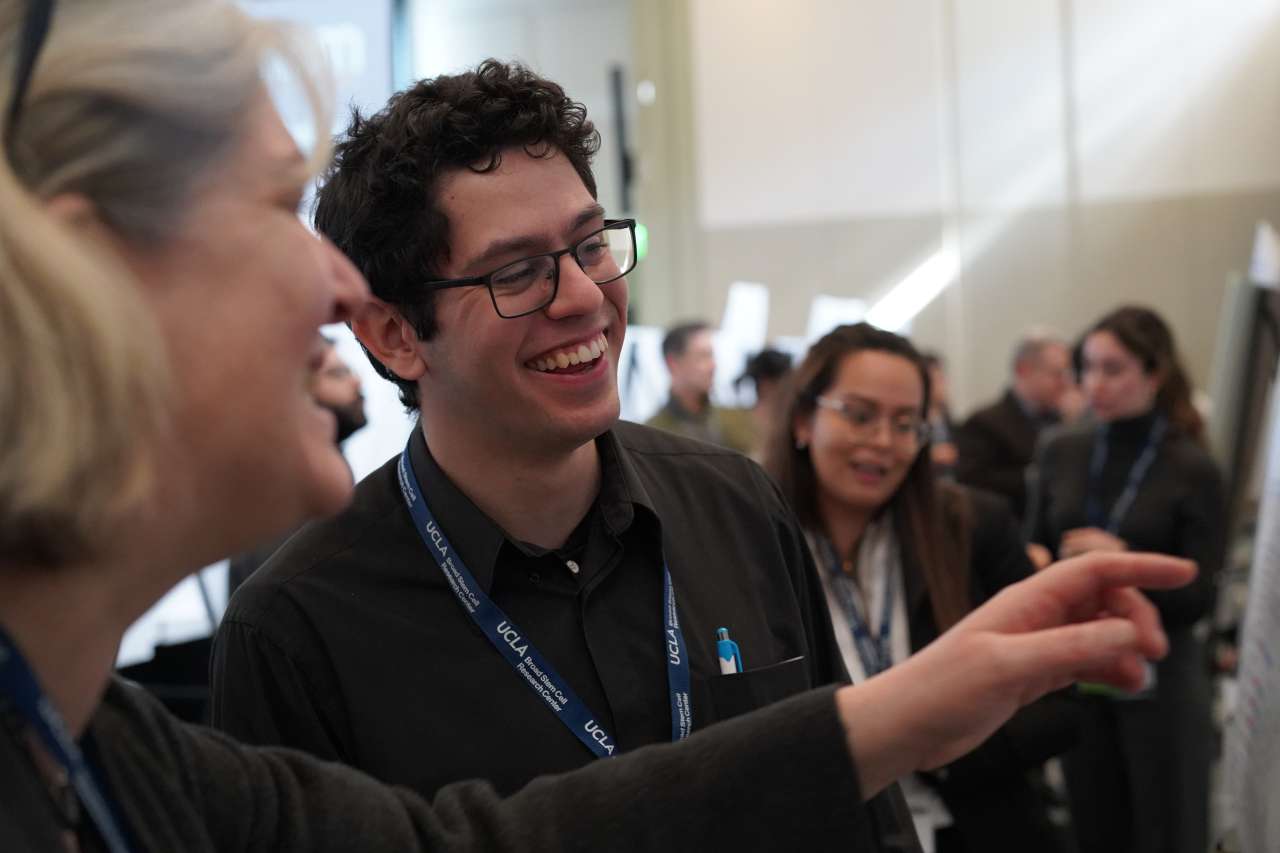
Dr. Butler recalls that during his early tenure, Rodriguez was so excited by his research that he’d work in the lab until the early morning hours. Concerned about the impact of such long hours, lab members advised him to scale back slightly. Even with more sustainable hours, Rodriguez continued to contribute significantly to three different projects and earned a reputation as “the go-to person with the magic touch who gets challenging stem cell protocols to work.”
His research in the Butler lab, supported by The Marcus Foundation, focuses on turning stem cells into specialized nerve cells called dorsal interneurons — cells in the spinal cord that relay sensory information like touch and pain from the body to the brain. The ultimate goal is to use these specialized cells as a type of cellular replacement therapy, targeting specific areas of damage within the spinal cord.
"Patients who have lost their sense of touch are unable to feel the comfort of a hug or a cool breeze on their skin, so trying to give that piece of connection back to them is what really motivates me," Rodriguez said.
The lab’s previous studies have developed the first protocols to turn embryonic stem cells into dorsal interneurons. The first-generation college student's research in this area has built on these findings and led to another major scientific breakthrough: protocols that produce the dorsal interneurons in the posterior spinal cord that process specialized sensory information.
"The implications are enormous. The ability to make the most posterior dorsal interneurons opens up the possibility of restoring bladder control, a long-sought goal in the spinal cord regeneration field," said Dr. Butler, a professor of neurobiology at the David Geffen School of Medicine at UCLA. "Cris is on a rising trajectory toward becoming a remarkable scientist and has the unique combination of qualities — brilliant, stubborn, grounded and dedicated — that I believe will let him change the world."
Family sacrifice
Rodriguez's journey is rooted in his family's history of hard work and sacrifice. His family had been tenant farmers in Jalisco, Mexico for generations, laboring on land they never owned. Neither parent had seen the inside of a classroom — childhood for them meant work and survival. But their decision to come to the United States enabled their children to pursue dreams they had deferred.
The calling to heal runs deep in the Rodriguez family: two of Cristian's siblings are nurses, and another sibling is a medical student at UCLA.
Years ago, as his father's arthritis made it increasingly hard to keep up with the demands of his gardening business, Rodriguez made a promise to help support his parents.
"My mom still works at Wendy's, and even though they’re in their 60s and 70s, both of my parents continue to work incredibly hard," he said. "Whenever I'm not in school or the lab, I'm out there on weekends helping my dad with his gardening jobs because taking care of my family will always be my top priority."
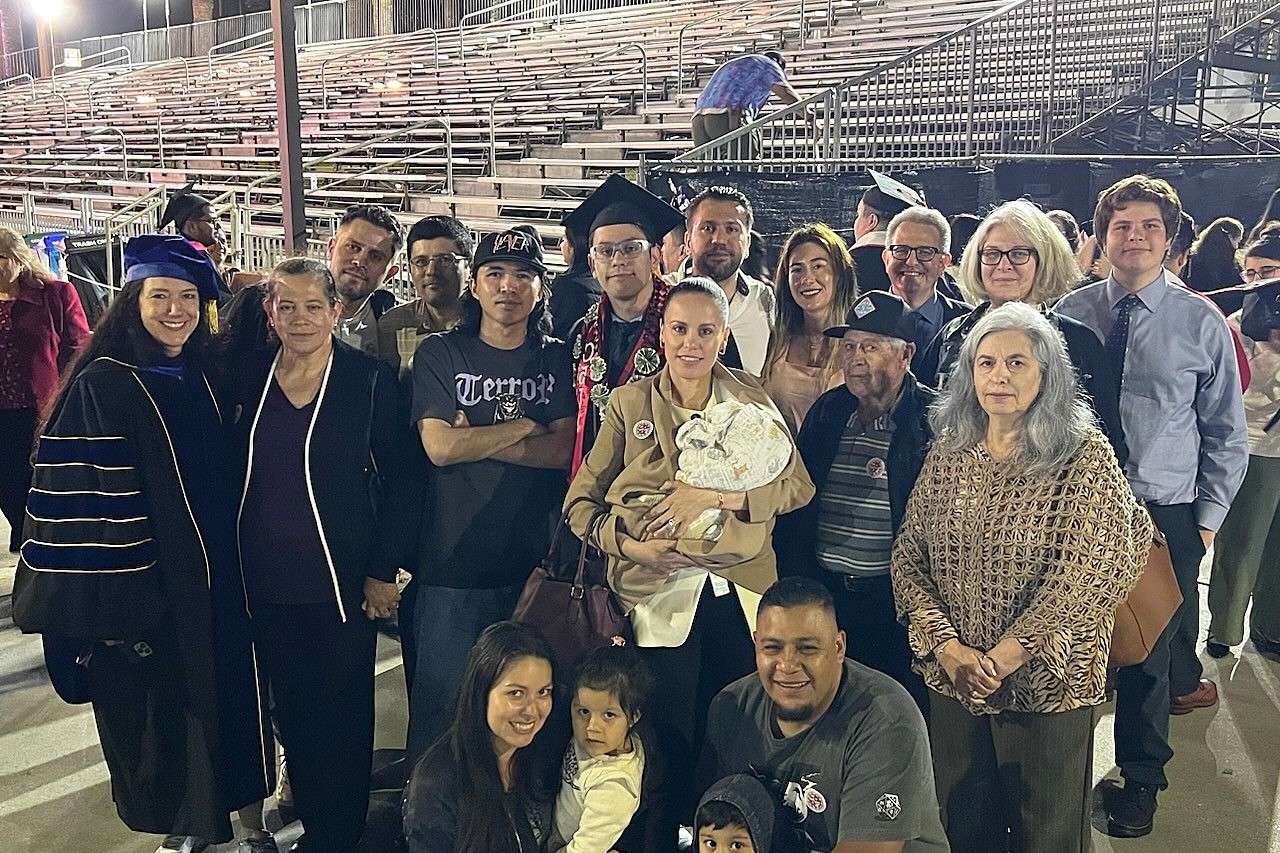
The weight of his family's sacrifices is never far from his mind, but it's also what drives him forward.
“The pen to my story has always been in my hands, not controlled by my socioeconomic status,” Rodriguez told fellow graduates in his commencement speech. “No matter what challenges you face, you are the author of your story, and you get to decide how your chapters are written.”
Continuing the cycle of mentorship
Despite juggling demanding coursework, research and weekend shifts helping his father's business, Rodriguez still found a way to give back to underserved youth by becoming a camp counselor with C5LA, the organization that had opened the door to his own college dreams.
He has since moved into a leadership role, mentoring his own group of teens along their road to college — young people he first met when they were 13 and who are now 16. This summer, he'll take them on a weeklong backpacking adventure, one of C5LA's flagship programs.
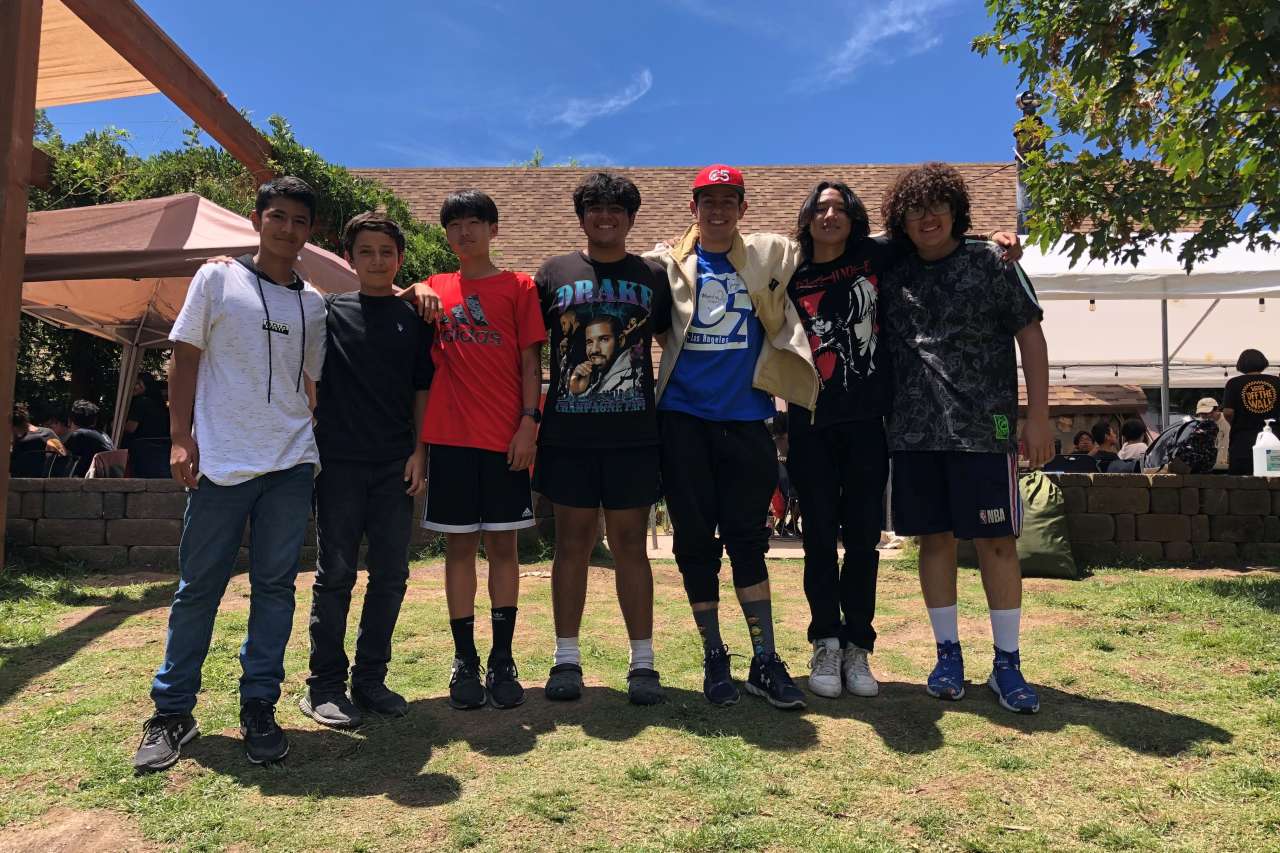
For Rodriguez, the most rewarding part is watching his mentees discover their potential.
"Someone once took the time to mentor and teach me, so I believe in paying it forward," he explained.
His gift for teaching extends seamlessly into the lab, where Dr. Butler quickly recognized his rare combination of technical skill, passion and natural leadership.
"He not only mentors undergraduate students in the lab, but he also helps rotational graduate students and post-docs learn new stem cell techniques," Dr. Butler said. “Cris is absolutely beloved in our lab. He is the bringer of birthday cakes, is always upbeat and is always willing to give a new experiment a go.”

Dr. Malone, director of the CSUN-UCLA Bridges to Stem Cell Research Training Program, has watched Rodriguez's scientific journey unfold from the beginning. What impresses her most isn't just his research abilities, it's his character.
"Name any positive adjective about a student, scientist, leader — and they all apply to Cristian," she said. "He’s the type of person who I hope my kids grow up to be."
Now that he has graduated, Rodriguez will be applying to PhD programs in regenerative medicine while working full-time in the Butler lab as a post-baccalaureate researcher.
Where that path will ultimately lead him — perhaps to running his own lab one day — remains an open question. But one thing is certain: He's determined to bridge the gap between lab discoveries and actual treatments that help patients.
"I want to make sure that the research we're doing today becomes the therapy that changes someone's life tomorrow," he said. "That's what keeps me going."
